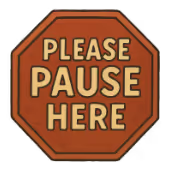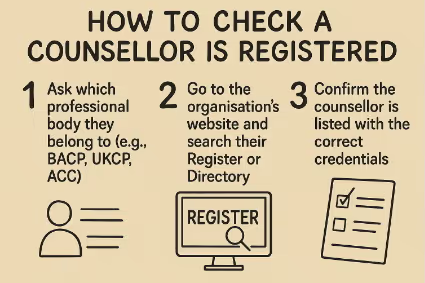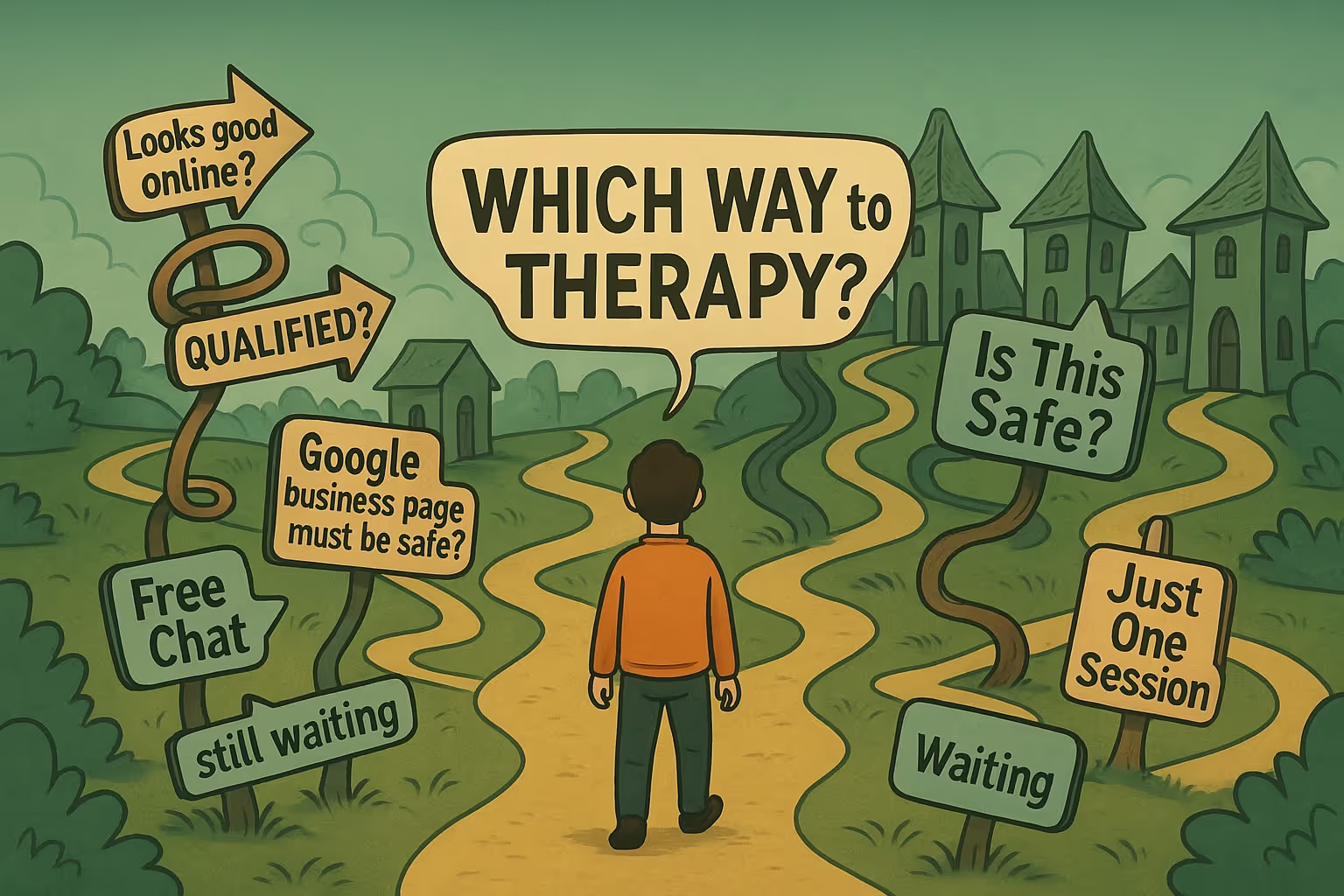If you’re starting here…
If you’ve read this earlier post about the space between self-help and therapy, this might be the natural next step. And if this is your first time here - welcome.
Take what resonates, leave what doesn’t. If you're still unsure whether therapy is the next move, the earlier post might offer something useful. It explores the space between managing on your own and seeking deeper support, looking at both the power and the limits of self-help. A space to reflect on what’s working for you right now, and what’s maybe not.
Whether you’re feeling stuck, overwhelmed, or just curious - both posts are here to offer perspective and things to consider.
So, you’ve decided to take that step - you’re considering therapy
Taking that first step towards therapy can feel like a huge move and it really is an achievement. At the same time, it’s completely normal if it also feels a little (or even very) daunting. Therapy is personal. Starting this kind of journey takes courage. Working with a counsellor is a deeply emotional process - it brings vulnerability and raw feelings to the surface. The space is meant to hold all of that, without judgement. And that’s why finding someone you feel at ease with - someone you can begin to trust, or at least consider trusting (because let’s face it, trust doesn’t always come easy) - is so important.
That trust? That space - it starts with your very first connection.

But before you go there, here are a few nitty-gritty things to consider:
Counselling in the UK is Unregulated
Yes - unregulated. This part is so important and still something not everyone knows.
Despite growing awareness, many people still don’t realise that in the UK, the title “counsellor” or “therapist” isn’t legally protected.
That means anyone can call themselves a therapist even without formal training.
Let that sink in:
- One person might have completed years of in-depth, face-to-face training, including supervised clinical placements, personal therapy, and ongoing professional supervision - all to ensure they can work ethically and safely.
- Another might have taken a quick online course… or worse, none at all.

Yet both can legally use the same title.
Yes, there are few protected titles (like clinical psychologist), but many people offering therapy don’t fall under those categories. This is where professional bodies come in (like the BACP, UKCP, or NCPS). They uphold ethical codes, training standards, and complaints procedures.
But - and here’s the important part - joining one is voluntary.
Yes, you read that right:
The profession is unregulated - and belonging to a professional body is voluntary.
These bodies are voluntary, but in my experience, most qualified counsellors who have trained for years understand the importance of being members. They usually also have valid insurance, register with the ICO for data protection, and take part in ongoing supervision and CPD (continuing professional development).
Now, what if a therapist says they’re fully qualified but, for one reason or another, isn’t a member of a professional body?
Well, that’s at least transparent, and it gives you space to make an informed choice. They might be a highly skilled, ethical practitioner… or they might not. The key is knowing the facts so you can decide.
Because when you’re opening up your inner world to someone, you deserve to do it with your eyes wide open.
Professional bodies exist to help self-regulate the profession.
If a counsellor is a member of a professional body, it means they have:
- Met specific training standards
- Agreed to follow an ethical framework
- Participate in regular supervision and CPD (continuing professional development)
- Are subject to a formal complaints procedure
Some of the main ethical bodies in the UK include:
- BACP (British Association for Counselling and Psychotherapy)
- UKCP (UK Council for Psychotherapy)
- ACC (Association of Christian Counsellors)
- NCPS (National Counselling and Psychotherapy Society)
Being a member of a ethical body also means the counsellor’s qualifications have been verified. They are insured to practise and are likely GDPR compliant (by registering with the ICO).
In short: checking whether your potential therapist is listed on a professional register is one of the simplest ways to make sure you’re choosing someone qualified.

How to check?
- Ask which professional body they belong to (e.g., BACP, UKCP, ACC).
- Go to the organisation’s website and search their Register or Directory.
- Confirm the counsellor is listed with the correct credentials.
Every major ethical body in the UK has a public online register. It’s quick to check and offers peace of mind - knowing someone has had their training, insurance, and practice history reviewed.
If they’re not listed? It may mean they aren’t registered, or their membership has lapsed.
And please know, ethical therapists welcome these checks. We want you to feel safe. These days, it’s easy to build a sleek website and appear “professional,” but being registered is a sign of genuine, accountable, qualified practice.
What about directories?
You might have come across a potential therapist through a directory like Counselling Directory or Psychology Today. These platforms can be really useful - helping you filter by location, the issues you want to work on and therapy approaches.
It’s worth knowing that these directories are independent platforms. Being listed on one isn’t the same as being a member of a professional body - instead, it’s an additional paid subscription that therapists can choose to opt into. Many counsellors use them to increase visibility, while others choose not to subscribe at all, even though they are qualified and registered.
That said, the therapists who are listed on these directories have gone through a verification process. These platforms check that each counsellor has valid insurance and is a current member of a recognised professional body - and this is usually displayed clearly on their profile.
Still, if you ever feel unsure, you can always go straight to the source: the professional body’s register. It’s quick to check, and it gives you extra peace of mind.
Safety first, now what?
Once you’ve done the practical checks and created a shortlist — then it’s all about connection.
Finding the right fit: one chat or a few?
More and more therapists now offer an initial chat - a short call (often from 10 to 25 mins) to see if the connection feels right. And that initial chat can be a helpful tool, but it can also leave you feeling a bit lost.
Some people feel comfortable setting up several of these calls and seeing who feels like the best fit. Some might speak to just one therapist and go with their gut. Others may decide to dive straight into a first session trusting that a full session might give them a better sense of whether this is the right person to work with.
There’s no one way to do it - just your way. Maybe a couple of chats would help you feel clear. Or maybe too many chats would overwhelm rather than support your process. You know yourself best.
"The relationship is the therapy.” (Carl Rogers)
A good therapist-client relationship is built on trust, attunement, and that sense of being seen. That might happen in the first chat… or it might take a session or two.
Go with what feels right for you.
And here’s a reminder: if something feels off, even after a few sessions — bring it up. Talk about it. And if it still doesn’t feel right? It’s okay to make a change. Therapy should be a safe place for you — and finding the right fit is part of the process.
Your mind deserves the same care and safety as your body — so take your time, ask the questions and choose someone you truly feel safe with.


